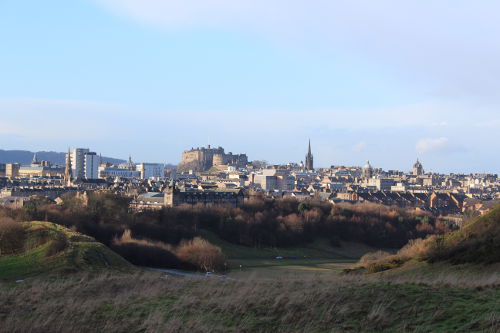Wednesday June 24th 2020

When it was revealed on Tuesday that on-street parking could be banned in nine high streets across Edinburgh, residents were quick to express their shock – both positive and negative – at the announcement.
It has been understood for some time that sooner or later city roads will undergo changes to become greener and less car-centric.
But this latest development came about quite suddenly, with only “key stakeholders” being informed and no full public consultation exercises taking place.
In order to “facilitate social distancing”, Edinburgh City Council is looking to “suspend all parking places apart from loading bays and disabled persons’ parking places” on main roads in and around Corstorphine, Easter Road and Great Junction Street, Gorgie and Dalry, Minto Street, Morningside and Bruntsfield, Portobello, Queensferry, Stockbridge and Tollcross.
Along these roads, plans are also in place to widen footways and remove guardrails, as well as to reduce traffic and increase cycling and public transport provisions.
While the council says these changes are both temporary and a response to the coronavirus crisis, its website also states: “Some of these temporary changes will mirror longer-term plans in our Active Travel action plan. We will continue to develop and implement those plans on a permanent basis as we move out of the current Covid-19 situation.”
Keen cyclists and environmentalists in Edinburgh have been overwhelmingly supportive of banning cars and widening streets. However, many local business owners are concerned that a loss of parking spaces will lead to a loss of customers.
Garry Clark, Development Manager for the East Scotland branch of the Federation of Small Business said: “I wouldn’t want to say these changes will be a negative for every business, it just really depends on the type of business and their customer base. I would hope that the council have tried to gain an understanding of this before making changes to parking.
He added: “A business that relies very heavily on local people shopping in the local shops may not find these changes to be a big issue. For those businesses who have a wider customer across or outside of the city, it may well be an issue. There is also the case of what kind of products the businesses sell. Is it something that can be carried back in hand to and from a household or is it something bulkier that you couldn’t transfer by foot or by bike?”
Whilst concerns among local businesses are well-founded, it is worth noting that a variety of studies have found that improving pedestrian and cycling provisions in town centres can have a positive commercial impact.
A 2018 study, ‘The Pedestrian Pound’, found that “well-planned improvements to public spaces can boost footfall and trading”. The study reported that a £10 million investment to make Piccadilly Street in Stoke-on-Trent more pedestrian-friendly led to 30 per cent more footfall in the area.
Annmarie and Josef Bailey own The Quarter, a café, bar and restaurant situated on Piccadilly Street. They have found pedestrianisation to be “overwhelmingly positive.”
Mr Bailey said: “Pedestrianisation is great for footfall, as well as the amount of time customers spend in the area because they feel safe. I think the council just have to go about it sensitively and balance the impact on businesses operations to ensure they can trade positively.
“We have outdoor seating areas and racks for cycles, which are really good for encouraging people to spend more time in the area. Obviously, Edinburgh has got a huge depth of creative tourism. Places like the Royal Mile already have an element of pedestrianisation and I think it is a natural progression for a big city to continue doing that.”
Whether or not banning on-street parking is an overarchingly positive step will, as ever, depend on who you ask.
Green Cllr Claire Miller describes the move as a “win-win-win” because there will be “better road safety, less congestion and less air pollution all at the same time as reversing a decades-long trend of decline in town centres.”
Others are more wary of the council’s plans. Christine Jardine, MP for Edinburgh West, believes that “it’s important to make environmental improvements, but you have to consult local businesses and local businesses have to be happy with them.”
Coronavirus and council efforts to make Edinburgh eco-friendly has changed and will continue to change the way people travel and shop in the city. Change can be scary – on a personal, social and economic level. But are changes like pushing cars out town centres ultimately a good or bad thing? Only time will tell.
Tweet Share on Facebook